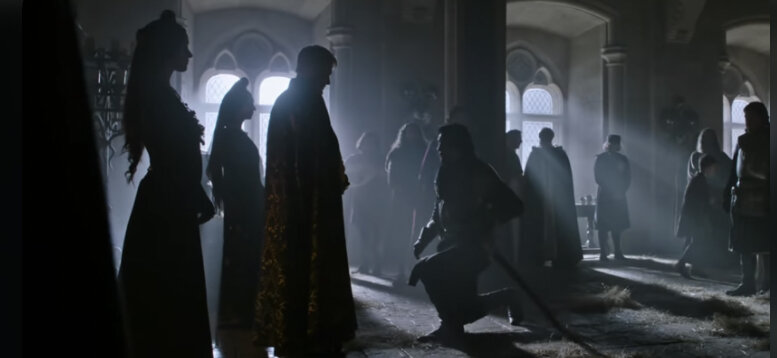“The Last Duel” Is Ridley Scott’s take on Kurosawa’s “Rashomon.” A impeccably well-acted, based-on-true-story epic set in 14th century Paris, the film is an adaptation of Eric Jager’s book and it does indeed use the influential three-points-of-view storytelling style that Kurosawa used in his own classic.
Nicole Holofcener and Oscar winners Matt Damon and Ben Affleck wrote the screenplay, which takes place in the bloody Middle Ages where women were literally known as property. Damon stars as Jean de Carrouges, an illiterate, but battle-celebrated warrior who saves the life of fellow squire Jacques Le Gris (Adam Driver). They end up becoming inseparable outside the trenches.
Years later, Carrouges falls for Marguerite (Jodie Comer), the daughter of a rich traitor (Nathaniel Parker), while Le Gris hangs out at orgy parties with King’s libertine cousin, Count Pierre d’Alençon (played with immeasurably snarky playfulness by Ben Affleck). The main quarrel, however, complete with a lawsuit, involves a rape charge; Marguerite accuses Le Gris of taking her. A rattled Carrouges calls for a fight to the death, a medieval duel, so that “God will prove” who is telling the truth.
Topical and timely, the film actually takes place during the Black Plague, and the male delusionment is all over this 153 minute epic, almost comically so. The story is told three times, from three different points of view and in three chapters: Jean de Carrouges, Jacques Le Gris and Lady Marguerite de Carrouges all make their case to the court (and the viewer). Turns out, not too shockingly, that both men fighting for the Lady’s heart are manipulators and liars.
Safe for Scott’s assured, veteran-like direction, the casting here is incredibly effective. Damon, looking grisly and unalluring here, is the war-torn hero who turns out to be a total schlub of a man and husband. Affleck, with dyed blonde hair, and ridiculous facial hair, chews up the scenery, both menacing, spoiled and infused with droll-like humour. I can’t think of the last time he’s ignited the screen with this much playful command.
Meanwhile, Driver’s Le Gris keeps us guessing; he’s at times more compatibly acquainted with Carrouges, and then this tall, dark and handsome soldier quickly surrenders himself to the alluring fuck parties that the Count invites him to. It’s a performance both relatable and menacing.
However, it’s Comer who comes out on top here. She’s a powerhouse of pent-up emotions waiting to burst at the seams. Her Marguerite is not just a victim but a powerless woman surrounded by male buffoons. If anything, she deserves much more screen time than she gets here.
The immersive production design is a Scott hallmark, very much the sweeping epic nature of “Gladiator” and “Kingdom of Heaven.” Despite the slow start, there’s a desperate and unsentimental savagery at play here and its two and a half hours go by in sprightly fashion. The unreliable narrator trope has been done plenty of time before, but the shapely way Scott constructs his narrative feels fresh and unassumingly penetrating.
The theatrics are delivered very much in soap opera fashion and, yes, the film doesn’t necessarily say anything new about male Chauvin, but these kinds of big, sprawling epics have been very much missing within the confines of the Hollywood studio system. Although inherently imperfect, and even over-the-top, it turns out that “The Last Duel” comes from one of the great craftsmen in cinema — veteran craftsmen like Scott are going extinct in Hollywood. It doesn’t reinvent anything but it’s an old-school yarn done right. [B/B+]






